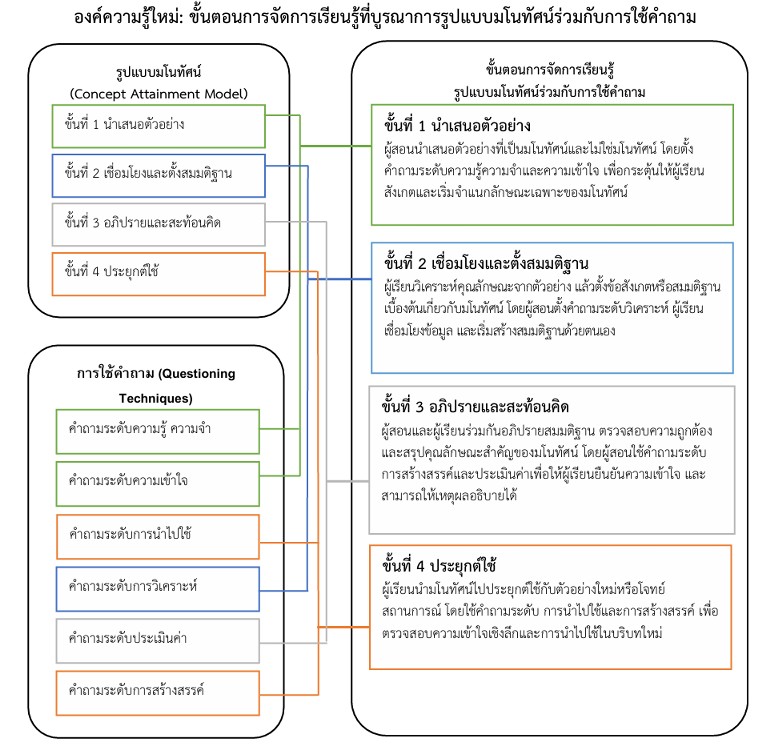The Effects of Concept Attainment Model Combined with Questioning Techniques on Learning Achievement and Concept Understanding in Thai Grammar among Undergraduate Students
Main Article Content
Abstract
This article aimed to study (1) the comparison of the pretest and posttest regarding Thai grammar learning achievements of undergraduate students who were taught using the Concept Attainment Model combined with Questioning Techniques, and (2) the development of conceptual understanding in Thai grammar among undergraduate students who were taught using the Concept Attainment Model combined with Questioning Techniques. The research design is a quantitative pre-experimental study with a one-group pretest-posttest design. The sample consisted of 36 Thai major undergraduate students from the Faculty of Education, Ramkhamhaeng University. They were selected through Stratified Random Sampling and Simple Random Sampling. The instruments for data collection included (1) lesson plans utilizing the Concept Attainment Model combined with Questioning Techniques, (2) Thai grammar learning achievement pretest and posttest, and (3) a Thai grammar concept comprehension assessment form. Data analysis was conducted using descriptive statistics, T-test for dependent samples, and Relative Gain Score. The research findings were as follows: 1) The mean score of the Thai grammar learning achievement posttest for undergraduate students who were taught using the Concept Attainment Model combined with Questioning Techniques was statistically significantly higher than that of the pretest at the .05 level. 2) The Thai grammar concept comprehension of undergraduate students who were taught using the Concept Attainment Model combined with Questioning Techniques showed a higher level of Relative Gain Score.
Article Details

This work is licensed under a Creative Commons Attribution-NonCommercial-NoDerivatives 4.0 International License.
References
กฤษณา สมบัติ. (2565). ผลการใช้คำถามตามแนวคิดของบลูม (BLOOM) เพื่อพัฒนาทักษะการอ่านคิดวิเคราะห์ของนักศึกษาสาขาวิชาภาษาไทย ชั้นปีที่ 2 มหาวิทยาลัยราชภัฏเชียงใหม่. วารสารมนุษยศาสตร์และสังคมศาสตร์ มหาวิทยาลัยราชภัฏเชียงใหม่, 4(1), 66–80.
ขัณธ์ชัย อธิเกียรติ. (2567). ประธานหลักสูตรศึกษาศาสตรบัณฑิต สาขาวิชาภาษาไทย (4 ปี) (หลักสูตรปรับปรุง พุทธศักราช 2562) คณะศึกษาศาสตร์ มหาวิทยาลัยรามคำแหง. สัมภาษณ์. 11 ธันวาคม.
ทิศนา แขมมณี. (2564). ศาสตร์การสอน: องค์ความรู้เพื่อการจัดการเรียนรู้อย่างมีประสิทธิภาพ. กรุงเทพฯ: จุฬาลงกรณ์มหาวิทยาลัย.
นลินี ณ นคร. (2561). วิธีการประเมินผลตามสภาพจริง. กรุงเทพฯ: สันติศิริการพิมพ์.
มาเรียม นิลพันธ์. (2558). วิธีวิจัยทางการศึกษา. (พิมพ์ครั้งที่ 9). นครปฐม: มหาวิทยาลัยศิลปากร.
ศิริชัย กาญจนวาสี. (2556). ทฤษฎีการทดสอบแบบดั้งเดิม. (พิมพ์ครั้งที่ 7). กรุงเทพฯ: จุฬาลงกรณ์มหาวิทยาลัย.
ศิริรัตน์ ดีโต และ ปกรณ์ ประจันบาน. (2561). ผลการจัดกิจกรรมการเรียนรู้ตามรูปแบบการสอนมโนทัศน์ที่มีต่อมโนทัศน์ทางคณิตศาสตร์ เรื่อง ตัวหารร่วมมากและตัวคูณร่วมน้อย ของนักเรียนชั้นมัธยมศึกษาปีที่ 1. วารสารศึกษาศาสตร์และนวัตกรรม, 20(2), 224–232.
ศิริวรรณ เอี่ยมประเสริฐ. (2563). ผลการจัดการเรียนรู้แบบสืบเสาะหาความรู้ 5 ขั้น ร่วมกับเทคนิคการใช้คำถามที่มีต่อผลสัมฤทธิ์ทางการเรียนและมโนทัศน์ทางชีววิทยาของนักเรียนชั้นมัธยมศึกษาปีที่ 4. (การศึกษามหาบัณฑิต, มหาวิทยาลัยบูรพา).
สุทธิพงษ์ มากุล. (2568). อาจารย์ประจำหลักสูตรศึกษาศาสตรบัณฑิต สาขาวิชาภาษาไทย (4 ปี) (หลักสูตรปรับปรุง พุทธศักราช 2562) คณะศึกษาศาสตร์ มหาวิทยาลัยรามคำแหง. สัมภาษณ์. 8 มกราคม.
Chica, Y.I. (2018). Questioning as an Effective Tool to Enhance Students´ Interaction in the English Classroom. International Congress on the Didactics of the English Language Journal, 3(1), 1-8.
Chimmalee, B., & Anupan, A. (2022). Effect of Model-Eliciting Activities Using Cloud Technology on the Mathematical Problem-Solving Ability of Undergraduate Students. International Journal of Instruction, 15(2), 981-996.
Estes, T. H., & Mintz, S. L. (2016). Instruction: A model approach. Boston, MA: Pearson.
Habib, H. (2019). Effectiveness of Concept Attainment Model of Teaching on Achievement of XII Standard Students in Social Sciences. Shanlax International Journal of Education, 7(3), 11-15.
Ho, T. M. L., & To, M. T. (2022). Delegating critical thinking skills in learners through effective questioning technique in the class. International Journal of TESOL & Education, 2(3), 13-31.
Ifrianti, S., Maharani, L., Komikesari, H., Yusandika, A. D., & Jamilah, S. (2019, February). The influence of concept attainment models on students’ conceptual understanding. In Journal of Physics: Conference Series (p. 012020). Bristol: IOP Publishing.
Kaur, S., & Kaur, A. (2024). Investigating the constructivist concept attainment model’s influence on social studies concept acquisition of secondary school students. Journal of Emerging Technologies and Innovative Research, 11(7), 134–139.
Kibane, C. R., & Milman, N. B. (2014). Teaching models: Designing instruction for 21st century learners. Upper Saddle River, NJ: Pearson.

